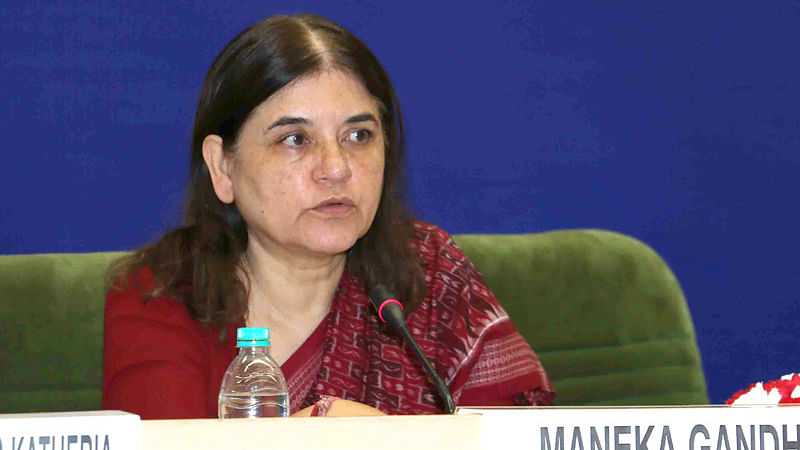The Prime Minister’s Office wanted the WCD ministry to implement a cash transfer scheme instead of foodgrains, but Maneka Gandhi decided to stop it.
New Delhi: In the space of three months, two Union ministries have shown the red-flag to Prime Minister Narendra Modi’s pet Direct Benefit Transfer scheme.
First, it was the Consumer Affairs, Food and Public Distribution Ministry headed by ally Ram Vilas Paswan in August, and now, it’s the Maneka Gandhi-headed Women and Child Development (WCD) Ministry.
The Food Ministry had started a pilot scheme in Jharkhand’s Nagri block to directly transfer food subsidy into beneficiaries’ account instead of giving them subsidised rations. However, it withdrew the scheme in August, citing “challenges” faced by the state government in implementing it effectively.
Owing to this failure, Gandhi has now directed the WCD Ministry to stop the proposed conditional cash transfer scheme, which was supposed to replace the practice of providing nutritious take-home rations to children below three years of age, pregnant women and lactating mothers.
The Direct Benefit Transfer scheme was launched by the UPA government in 2013 as an alternative to the corruption-riddled public distribution system, but it was under the Modi government that it got promoted.
In 2015, the scheme was introduced for the first time in the Union Territories of Chandigarh, Puducherry and Dadra and Nagar Haveli. The response has been lacklustre.
Before the Nagri pilot project, the Puducherry government had also requested the Centre to withdraw the scheme and revert to the old system. Paswan recently conveyed the ministry’s “in-principle” approval to allow Puducherry to revert.
Paswan’s letter
Gandhi’s direction to her ministry came after Paswan responded to her request and shared the Food Ministry’s experience in Nagri.
In a letter to Gandhi on 31 October, Paswan wrote that a field study revealed beneficiaries had to travel long distances and incur substantial expenses every month to withdraw the subsidy amount from their bank accounts.
The pilot project had begun in October 2017, and required complicated back-end processes, a complex management information system, and a number of follow-up processes. Since the Jharkhand government’s processes were not completely automated, they were prone to human error.
A study conducted to gauge the impact of the pilot scheme revealed that beneficiaries preferred foodgrains instead of the Direct Benefit Transfer scheme. Thirty-six out of 38 gram sabhas also preferred foodgrains.
Also read: Three years on, Modi Sarkar tinkers with UPA schemes in its pursuit of a rural makeover
Nitty-gritties of the CCT
The Central government’s supplementary nutrition programme is aimed at fighting child malnutrition and maternal mortality by bridging the gap between the recommended diet and the average daily intake. It provides micronutrient-fortified food material to children for Rs 8 per day, and for pregnant women and lactating mothers at Rs 9.50 per day from its anganwadis (child care centres).
There are 9.8 crore beneficiaries of the supplementary nutrition programme. This includes approximately eight crore children under the age of six, and 1.8 crore pregnant women and lactating mothers.
The conditional cash transfer scheme had been first recommended to the WCD Ministry by the National Council for Nutrition, headed by NITI Aayog vice-chairman Rajiv Kumar.
The Prime Minister’s Office had directed the WCD Ministry in June to launch the conditional cash transfer scheme in 10 districts across 10 states. Even at that time, Gandhi had objected, saying the scheme was not feasible and would cause a lot of hardship to the women and children.
After Paswan’s letter, Gandhi, in the first week of November, told WCD secretary Rakesh Srivastava to scrap the scheme and also wrote to Niti Aayog, asking for further directions.
“The minister has directed the WCD to scrap the proposed scheme. She has also written to the NITI Aayog, which was pushing for CCT, for further directions,” said a ministry official who did not wish to be named.
Also read: Top private hospitals may not participate in Modi govt’s flagship healthcare scheme
“The minister was of the view that CCT is an impractical idea as it will be too much of a hassle for pregnant women or lactating mothers to travel to banks to withdraw money.”
Beneficiaries under the conditional cash transfer scheme are supposed to receive Rs 200 per child (the cost for 25 days) directly into the mother’s account, and Rs 237.50 a month for each pregnant or lactating woman.
“Another problem is that the money transferred is not enough to buy the recommended rations. In the old system, the government buys the ration at wholesale rate and can afford to keep the prices low. But under CCT, the beneficiary, even if she adds her own money, won’t be able to afford the micronutrient-fortified food at market rates,” said the WCD Ministry official.
